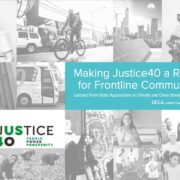
released its report on national environmental justice investment strategy, Making Justice40 a Reality for Frontline Communities
THE UCLA Luskin Center for Innovation’s report on the Biden-Harris administration’s Justice40 effort emphasizes the importance of direct investment to communities most affected by the environmental and climate crisis.
The report included recommendations for the administration to make funds accessible to grassroots organizations and to have impacted communities more involved in policy and decision-making processes.
“Our communities are resilient but we are hurting right now,” Green Latinos Founding President and CEO and the report’s co-author Mark Magaña said in a press conference on Wednesday, October 20. “Now we must ensure that our frontline communities lead in the identification and the meeting of our own needs.”
Justice40’s initiatives to serve communities that are more likely to be affected by hurricanes, heat waves, overburdened by landfills, and those in reserves must work with coalitions and alliances that are in the communities’ network to ensure funds directly go to them, according to Maryland Institute for Applied Environmental Health Associate Professor and report co-author Sacoby Wilson.
The report also said certain communities are more susceptible to pollution and associated health problems like the Flint water crisis, fewer government resources, and occupational impacts from environmental policy transitions. Since there is a link between some communities of color and the environmental and climate crisis, Wilson suggested the involvement of organizations like the NAACP to be more included in environmental policy decision-making, a sentiment echoed by Magaña.
“These decisions should be made at the community level where the knowledge and lived experience should shape the justice40 initiative and its targeted investments,” Magaña said.
Organizations must be provided with systematic technical assistance and adequate funding in order for them to be able to serve the communities, according to Magaña.
“Many of our own members at Green Latinos have their own organizations and few of them are prepared to take government contracts and grants,” Magaña said. “It is a complicated process filled with legal issues and extensive compliance issues and many just don’t have the staff to do that. If the organizations who have been working with and within these frontline communities for years are not prepared for justice40, well then well-funded, fly-by-night operations will open up and come in and scoop up these federal dollars claiming they represent these communities. And then once again, we will not receive the investments, just the trickle-down benefits.”
Co-author and Luskin Center for Innovation’s Deputy Director Colleen Callahan suggested more investments in human infrastructure to assist organizations in receiving government grants. Magaña and Callahan also said the 40% mark of the budget should be considered a floor instead of a ceiling for investments for disadvantaged communities.
The discussion raised the issue of underfunding within environmental justice organizations. A 2020 report by the Building Equity and Alignment Initiative found that 1% of environmental grantmaking from the 12 largest environmental funders went to environmental justice groups. Northwestern University found half of the philanthropic funding on the climate crisis goes to 20 national organizations, of which 90% of them are led by white people, 80% of which are white men.
The report also recommends the implementation of multiple screening tools at the agency level that build upon the core Climate and Economic Justice Screening Tool to ensure accurate and holistic data. Callahan also suggested evaluations for all levels of government and contractors in their environmental goals to heighten responsibility.
While the report recommends new implementations, it also referenced past environmental initiatives that have proven successful and are equity-centered like the California Climate Investments Technical Assistance program, the Science, Technology, and Environmental Policy (STEP) program, the Property Assessed Clean Energy (PACE) programs, and Clean Cars 4 All.
President Biden’s budget for Fiscal Year 2022 has included investments to replace lead pipes and service lines and rehabilitate and retrofit affordable, resilient housing. The president will also invest in addressing legacy pollution and communities of color’s barriers to economic opportunity as part of the Bipartisan Infrastructure Framework.






